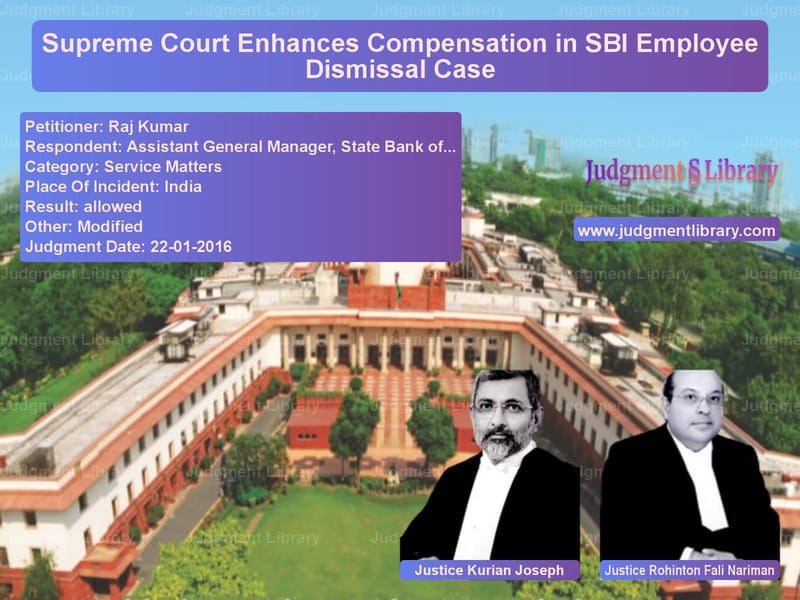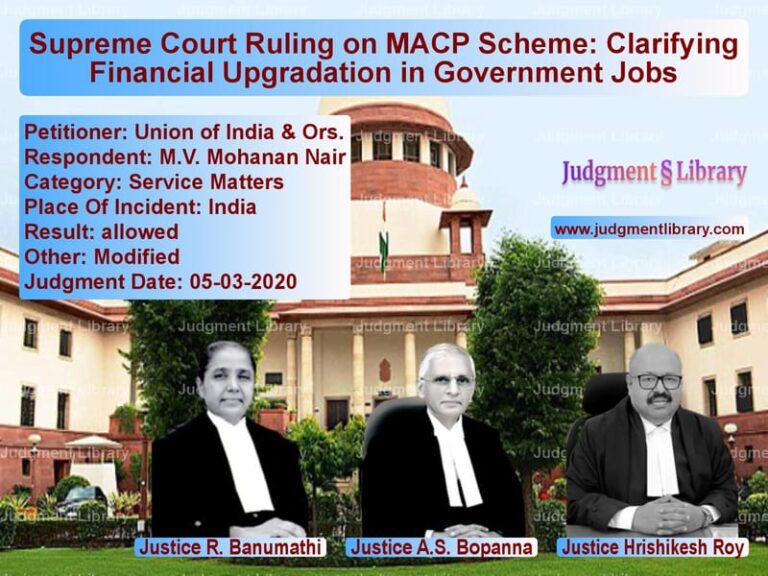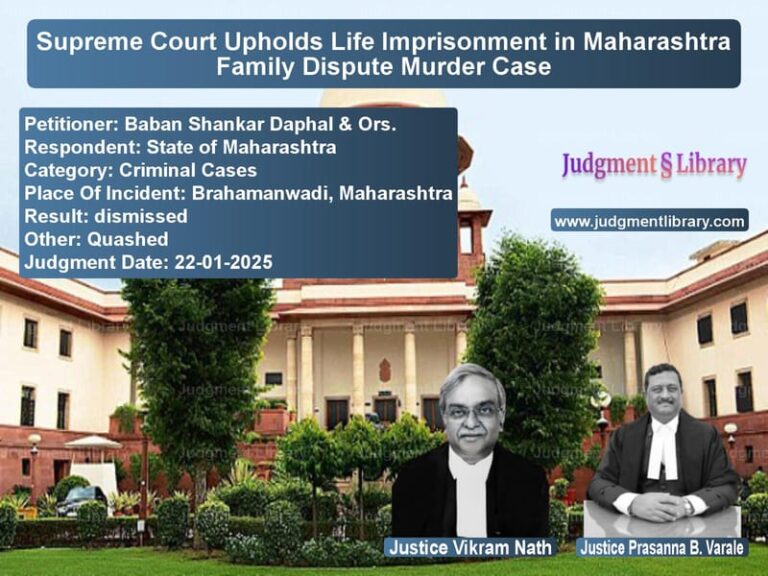Supreme Court Enhances Compensation in SBI Employee Dismissal Case
The Supreme Court of India, in its judgment dated January 22, 2016, in the case of Raj Kumar vs. Assistant General Manager, State Bank of India, addressed an employment dispute concerning wrongful termination and compensation. The judgment involved the reinstatement order initially passed by the Labour Court, which was later modified by the High Court to a compensation of Rs.75,000/-. The Supreme Court further enhanced the compensation to Rs.2,00,000/-, providing relief to the appellant.
Background of the Case
The case arose from a dispute between Raj Kumar (appellant) and the State Bank of India (respondent). Raj Kumar had worked for the bank intermittently from 1984 to 1993, after which he was terminated. The appellant challenged his termination before the Labour Court, which ruled in his favor, ordering reinstatement.
The bank, dissatisfied with the Labour Court’s decision, filed a petition in the High Court. The High Court overturned the reinstatement order and instead directed the bank to pay one-time compensation of Rs.75,000/-. Raj Kumar, feeling aggrieved by the High Court’s modification, appealed before the Supreme Court.
Key Legal Issues Considered
- Was the termination of the appellant legally justified?
- Should the appellant have been reinstated, or was compensation a more appropriate relief?
- Was the compensation amount of Rs.75,000/- granted by the High Court sufficient?
- What should be the fair compensation for the appellant’s long period of service?
Arguments by the Appellant (Raj Kumar)
- The appellant had worked for the bank from 1984 to 1993 and was terminated unfairly.
- The Labour Court had rightfully ordered reinstatement as the termination was unjust.
- The High Court’s decision to award a mere Rs.75,000/- as compensation was inadequate.
- The bank should either reinstate him or provide just and reasonable compensation.
Arguments by the Respondent (State Bank of India)
- The appellant was engaged on an intermittent basis and was not a permanent employee.
- There was no obligation to reinstate him as he was not a full-time employee.
- The compensation granted by the High Court was fair and reasonable.
- The appellant should not be entitled to any further claims.
Supreme Court’s Observations
The Supreme Court carefully examined the nature of the employment and the history of the case. It acknowledged that the appellant had worked with the bank for several years and that the Labour Court had initially ruled in his favor. However, the Court found that:
“Having regard to the period of work starting from 1984, though intermittently up to the year 1993, we are of the view that the interest of justice should be advanced in case the compensation is slightly enhanced and fixed at Rs.2,00,000/-.”
The Court also clarified:
“This amount shall be in addition to whatever has already been paid to the appellant.”
Supreme Court’s Ruling
The Supreme Court modified the High Court’s ruling and issued the following directives:
- The appellant was not entitled to reinstatement but was granted an enhanced compensation of Rs.2,00,000/-.
- The compensation amount had to be paid within six weeks from the date of the judgment.
- The appellant would have no further claim against the bank with respect to his previous engagement.
Key Takeaways from the Judgment
- Courts can modify reinstatement orders and grant monetary compensation in cases of wrongful termination.
- Long-term, intermittent employment can warrant compensation even if reinstatement is not granted.
- The amount of Rs.2,00,000/- was deemed a fair relief given the appellant’s service history.
- Legal disputes involving contractual or non-permanent employees must be considered on a case-by-case basis.
Impact of the Judgment
This judgment is important as it establishes a precedent for cases where reinstatement may not be feasible, but monetary compensation can serve as a just remedy. It ensures that employees engaged over a long period are not left without redress if their services are unfairly terminated.
Conclusion
The Supreme Court’s decision in Raj Kumar vs. Assistant General Manager, State Bank of India is a significant ruling in employment law. By enhancing the compensation, the Court provided a fair resolution that balances the rights of employees and employers. The ruling emphasizes that wrongful termination should not leave employees without a remedy, even if reinstatement is not viable.
Don’t miss out on the full details! Download the complete judgment in PDF format below and gain valuable insights instantly!
Download Judgment: Raj Kumar vs Assistant General Ma Supreme Court of India Judgment Dated 22-01-2016.pdf
Direct Downlaod Judgment: Direct downlaod this Judgment
See all petitions in Employment Disputes
See all petitions in Termination Cases
See all petitions in Judgment by Kurian Joseph
See all petitions in allowed
See all petitions in Modified
See all petitions in supreme court of India judgments January 2016
See all petitions in 2016 judgments
See all posts in Service Matters Category
See all allowed petitions in Service Matters Category
See all Dismissed petitions in Service Matters Category
See all partially allowed petitions in Service Matters Category







